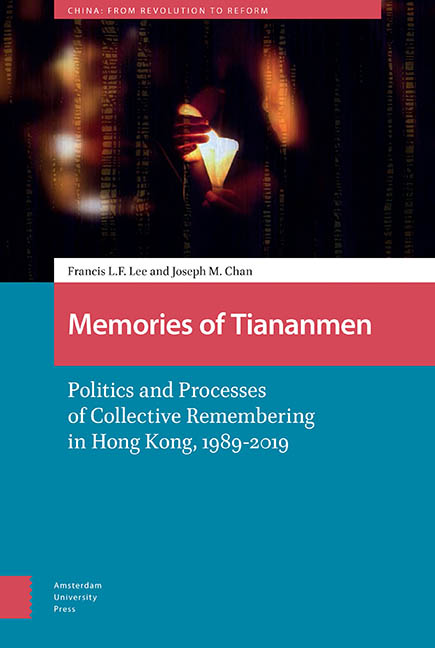Book contents
- Frontmatter
- Contents
- List of Figures and Tables
- Acknowledgments
- List of Abbreviations
- 1 Introduction
- 2 Memory Formation and the Valorization of Commemoration
- 3 Memory Mobilization
- 4 Intergenerational Memory Transmission
- 5 The Struggle for Memory Institutionalization
- 6 The Challenge of Localism and Memory Repair
- 7 Changing Attitudes toward Tiananmen?
- 8 Digital Media and Memory Balkanization
- 9 Conclusion
- Epilogue
- Appendix
- References
- Index
6 - The Challenge of Localism and Memory Repair
Published online by Cambridge University Press: 16 July 2022
- Frontmatter
- Contents
- List of Figures and Tables
- Acknowledgments
- List of Abbreviations
- 1 Introduction
- 2 Memory Formation and the Valorization of Commemoration
- 3 Memory Mobilization
- 4 Intergenerational Memory Transmission
- 5 The Struggle for Memory Institutionalization
- 6 The Challenge of Localism and Memory Repair
- 7 Changing Attitudes toward Tiananmen?
- 8 Digital Media and Memory Balkanization
- 9 Conclusion
- Epilogue
- Appendix
- References
- Index
Summary
Abstract
Chapter 6 discusses how Tiananmen commemoration was challenged from within the broadly defined pro-democracy movement in Hong Kong as a result of the rise of localism in the early to mid-2010s. The analysis reconstructs how the challenge of localism entered the mainstream media, and how the Umbrella Movement constituted a critical event strengthening this challenge. It also discusses how memory entrepreneurs responded to the challenge by reframing the significance of Tiananmen commemoration in order to seek common ground.
Keywords: memory repair, localism, critical event, Umbrella Movement
Chapters 2 to 5 have examined the processes involved in the formation and sustenance of collective remembering of the Tiananmen Incident in Hong Kong between the early 1990s and the early 2010s. Although Chapters 4 and 5 have also pointed to certain limitations in intergenerational memory transmission and memory institutionalization, on the whole, the memory entrepreneurs have largely been successful in defending the collective memory of the Tiananmen crackdown against the state's occasional attempts to undermine it. However, into the 2010s, collective remembering of Tiananmen in Hong Kong faced challenges coming from not only the state but also from within the opposition camp, especially public figures and movement activists belonging to the loosely defined faction of the localists.
From 2014 to 2018, the number of participants in the June 4 vigil in Victoria Park went down from 180,000 to 115,000, according to the Alliance, or from 99,500 to 17,000 according to the police (though the numbers rose again in 2019 for the 30th anniversary of Tiananmen). More importantly, since around 2013, there had been calls issued by localist activists and commentators urging people not to participate in the June 4 vigil. After the Umbrella Movement in 2014, criticisms against June 4 commemoration became even more vocal. Some young movement activists and student leaders argued that Tiananmen crackdown is an issue for the Chinese, but not Hong Kongers, to be concerned about. They rejected the claim that Hong Kong people have the responsibility to promote democratization in China. In 2015, The Hong Kong Federation of Students (HKFS) decided not to participate in the candlelight vigil.
- Type
- Chapter
- Information
- Memories of TiananmenPolitics and Processes of Collective Remembering in Hong Kong, 1989–2019, pp. 187 - 222Publisher: Amsterdam University PressPrint publication year: 2021



